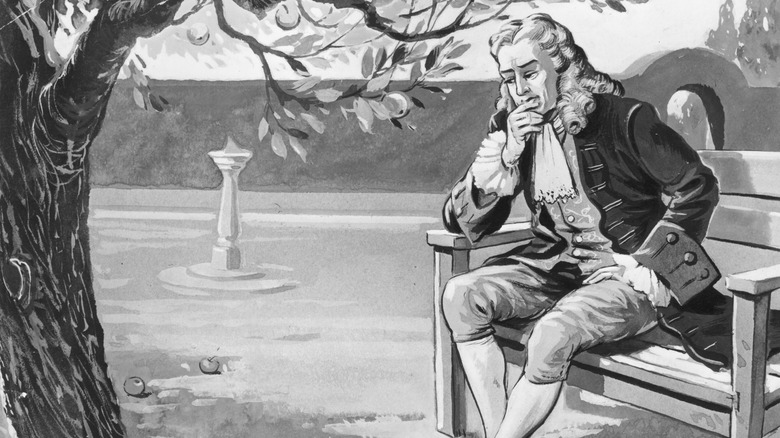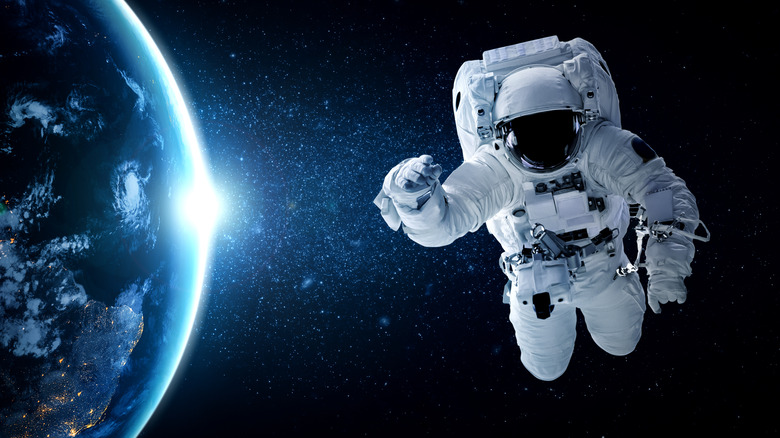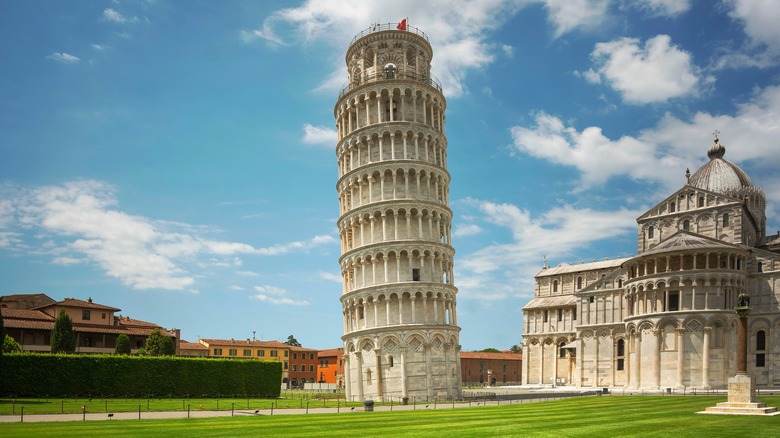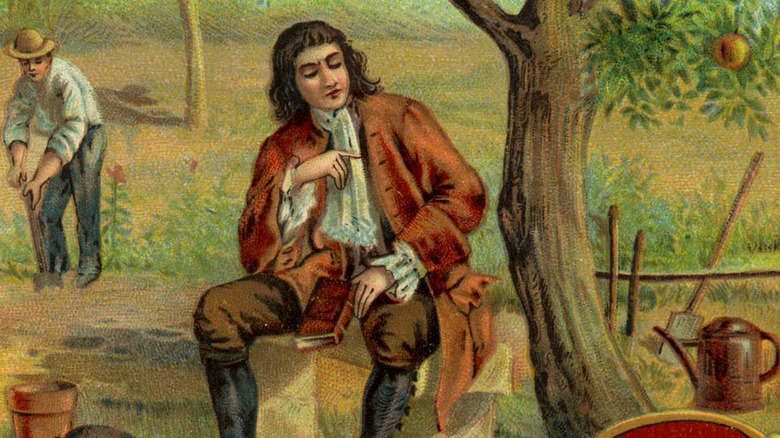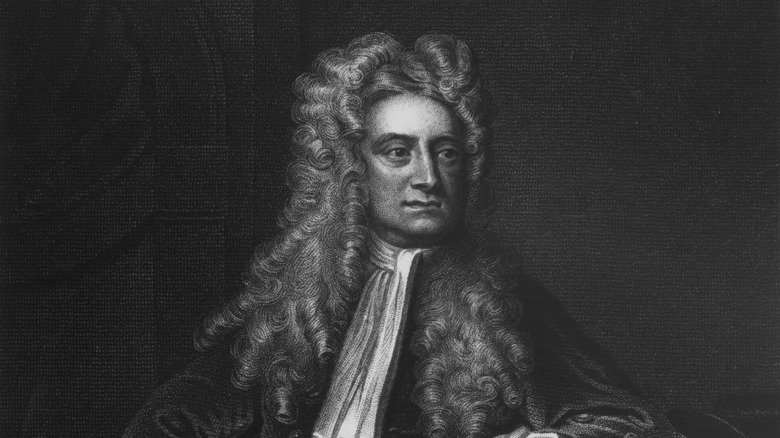Is It True That An Apple Fell On Isaac Newton's Head?
Much of what you think you know about history is based on misunderstandings, incomplete records, wishful thinking, or outright lies made up out of whole cloth. For example, you may have been taught in elementary school that, as a boy, George Washington chopped down a cherry tree and then 'fessed up to it to his father, being unable to utter a lie. No such thing ever happened — the whole thing was made up decades later, as History reports.
Another persistent historical myth is that famed scientist Sir Isaac Newton "discovered" gravity when an apple fell on his head. First of all, Newton didn't "discover" gravity at all; according to Sciencing, other researchers had done experiments on it and tried to figure it out. And of course, that says nothing of the billions of humans who had lived and died to that point, gravity being an inescapable part of their lives. Newton was simply the first to write a comprehensive law of universal gravitation, according to another History report.
Nobody 'discovered' gravity
How do you "discover" something that's always been a part of your life? You don't. Nobody "discovered" water or air or the moon; those things have always been there, and for hundreds of thousands of years, humans have largely gone about their lives without giving those things much thought. And since at no point in human history has anyone or anything simply drifted off into space, gravity always just sort of did its thing, regardless of anyone writing anything down about it.
That appears to have changed in the fourth century BC, however. As ThoughtCo explains, Greek philosopher Aristotle believed that objects moved toward their natural place in the universe; things fell toward the Earth because they are part of the Earth and are thus drawn back to the Earth realm. He wasn't wrong, but he wasn't right either. A few centuries later, according to McGill University, Indian astronomer Brahmagupta wrote that "bodies fall towards the earth as it is in the nature of the earth to attract bodies, just as it is in the nature of water to flow."
A century before Newton, another European also experimented on gravity.
Galileo was wrong
Building on centuries of earlier work, by the 1500s, Galileo Galilei had decided to experiment on the Aristotelian idea that heavier (more massive) objects are pulled by gravity more strongly than lighter (less massive) ones. He decided to test his theories out, although how he went about it remains in dispute. Sciencing claims that he did so by dropping objects of different weights from the Leaning Tower of Pisa (pictured above), while ThoughtCo claims that the Pisa story is a myth and that Galileo actually rolled balls down an inclined plane.
Regardless of the methodology, the outcome was the same: an object's weight does not affect how strongly it is attracted by gravity. This was conclusively proved during the Apollo 15 mission when astronaut David Scott dropped a hammer and a feather on the surface of the moon. With air resistance not being an issue, both fell at exactly the same speeds (the experiment can be seen on YouTube).
The apple (probably) didn't hit Newton on the head
Back in the middle 1600s, according to History, a young Isaac Newton went away to Cambridge University. However, a few years later, the bubonic plague was sweeping through England, and getting out of cities (for those who had the means to do so) was the top priority. Newton returned to his family's country home, Woolsthorpe Manor, and it was there that he was sitting under an apple tree when one fell from the tree and to the ground.
And we know (or, at least, are pretty certain) that the apple landed on the ground and not on his head based on a document that a friend wrote after hearing Isaac describe the moment, available via New Scientist. "After dinner, the weather being warm, we went into the garden and drank [tea], under the shade of some apple trees ... he told me, he was just in the same situation, as when formerly, the notion of gravitation came into his mind. It was occasion'd by the fall of an apple," the friend wrote. Note that Newton didn't mention that the apple fell onto his head, but rather, simply that it fell.
The falling apple changed everything
What Newton specifically noticed that day was that when the apple detached from the tree, rather than simply hoving in place or drifting off into space, it fell straight down to the ground (and not, presumably, his head). As ThoughtCo explains, Newton realized that the same falling motion that pulled apples (and everything else) toward the Earth was the same force that held the moon and the planets in their places.
In 1687, a solid couple of decades after the apple incident, Newton published his groundbreaking tome, "Philosophiae Naturalis Principia Mathematica," which contained his gravitational theories (among his dissertations on other subjects). According to History, Newton had worked out the relationship between every object in the universe that has mass and how they're attracted to each other. Specifically, he reasoned that every object in the universe that has mass is attracted to every other object that has mass, with a force directly proportional to the product of their masses and inversely proportional to the square of the distance between them.
But Newton was wrong
Despite the fact that his theories pulled together centuries of disjointed research, laid the groundwork for the study of physics, and eventually led to space travel (per Gizmodo), as it turns out, Newton was wrong about gravity. Or at least, he wasn't fully right.
By the early 1900s, as NBC News explains, astronomers had noticed that the orbit of the planet Mercury didn't perturb in ways that would be explained by Newtonian gravitational physics. Enter Albert Einstein: He came up with the idea that objects curve the very fabric of space itself, forming sorts of "wells" into which other objects swirl and eventually fall.
Meanwhile, Einstein's theories about gravity may not fully explain the universe, either. Kip Thorne, a Nobel Prize-winning theoretical physicist at the California Institute of Technology, notes that black holes are where Einsteinian gravitational physics fall apart. "The curvature of spacetime is so extreme that Einstein's general relativity fails. We don't understand how it works when the thing you're dealing with is extreme," he said, per NBC News.
Eventually, physicists hope to come up with a theory of gravity that is more complete than Newton's or Einstein's.
